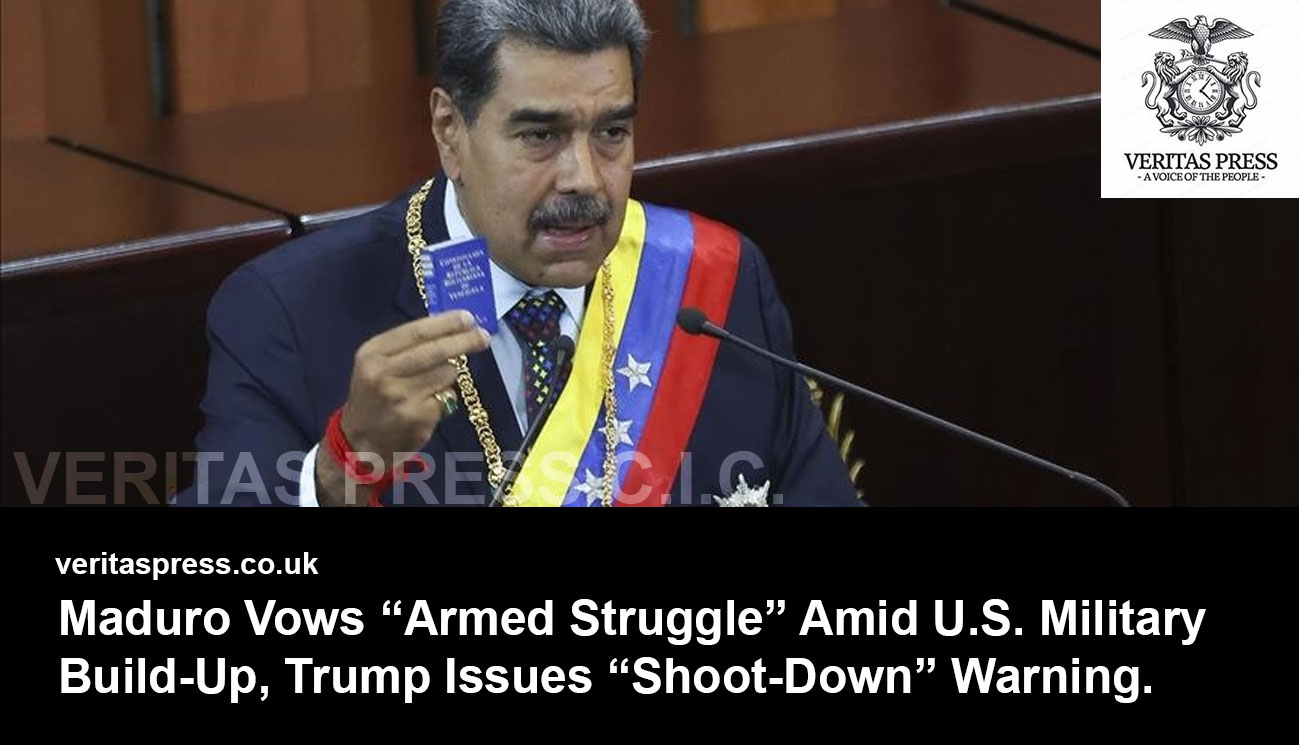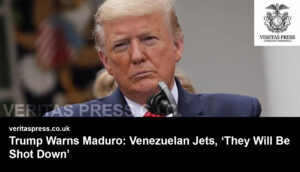Press Release: Veritas Press C.I.C.
Author: Kamran Faqir
Article Date Published: 06 Sept 2025 at 12:57 GMT
Category: Americas | Colombia | PM Maduro
Source(s): Veritas Press C.I.C. | Multi News Agencies
The Escalating Stand-off In The Caribbean:
U.S. Military Buildup:
The United States has dramatically increased its military presence in the Caribbean, deploying multiple warships, a submarine, Marines, and notably, ten advanced F-35 stealth fighter jets stationed in Puerto Rico. The operations are officially framed as targeting Latin American drug cartels and “narco-terrorism” networks.
Provocative Overflight:
Two Venezuelan F-16 fighter jets flew over the U.S. Navy destroyer USS Jason Dunham, an action the Pentagon deemed a “highly provocative move.” U.S. Defence officials accused it of interfering with ongoing counter-narco-terror operations.
Trump’s Overture to Force:
President Trump warned in the White House that if Venezuelan aircraft threaten U.S. vessels again, they “will be shot down.” Simultaneously, he downplayed any intent for regime change, even as CNN reported that military strikes targeting cartels inside Venezuela are being actively considered.
Maduro’s Defiant Response: Mobilising “Armed Struggle.”
From Political to Armed Defence:
President Nicolás Maduro, addressing mobilised troops and militia members, stated that Venezuela is now in a phase of political resistance, but if attacked, would shift to “armed struggle.” He called for full activation of the Bolivarian National Militia and “defensive, training, and retraining capacities of the entire population.”
Declaring a “Republic in Arms”:
Earlier reports revealed Maduro’s intent to declare a “republic in arms” should U.S. forces overshoot a threshold and attack, highlighting his framing of the U.S. deployment as the greatest continental threat in decades.
Foreign Minister’s Rebuttal:
Foreign Minister Yván Gil dismissed U.S. justifications as based on a “big lie”, specifically criticising claims of drug trafficking as a pretext for aggression by Washington and Secretary of State Marco Rubio. He emphasised Venezuela’s willingness to dialogue, so long as sovereignty is respected.
Militia Mobilisation:
In recent days, Venezuela has activated its Militia Bolivariana and mobilised reservists. This includes both institutional recruitment and community-based “communal defence” efforts, with enrollment facilitated through the government’s “Sistema Patria.”
Trigger Event: The Strike On The Caribbean Speedboat.
What Happened:
On September 2, 2025, the U.S. Navy reportedly launched an airstrike, via drone or helicopter, on a speedboat in the southern Caribbean, allegedly linked to Venezuela’s Tren de Aragua gang. Eleven individuals died in the attack. Washington released video footage, while Caracas denied the legitimacy of both the video and the claimed narco ties.
Questioned Legality and Accuracy:
Legal and international observers questioned the strike’s origin, authority, and authenticity. There’s no independent verification of the boat’s cargo or operator, and the U.S. has not clarified the legal rationale for this lethal action.
Strategic Implications:
The operation marked a bold escalation in Washington’s campaign, perceived not only as anti-drug enforcement but potentially as pressure on the Maduro regime. Analysts warn of creeping militarisation potentially spiralling toward broader conflict.
The Narrative Arcs: Stakes And Implications.
a) “Armed Struggle / Republic in Arms”
Maduro’s framing invites domestic and ideological mobilisation under existential threat. By casting any U.S. military escalation as an attack on national sovereignty, he seeks both internal unity and regional sympathy.
b) U.S. Military Posturing
Trump’s administration portrays its actions as defensive and anti-narcotics in nature. Still, the scale, including stealth jets, naval assets, and lethal strikes, hints at broader strategic pressure targeting the Venezuelan regime.
C) Regional Stability And Legal Dimensions
Actions by both nations raise serious questions: Are these legitimate anti-cartel operations or maelstroms of unnecessary aggression? This scenario challenges international norms regarding state sovereignty, military escalation, and executive overreach in the use of force.
Conclusion: A Region On Edge.
Tensions between the U.S. and Venezuela have reached a new high: jets buzzing naval vessels, strikes killing alleged cartel members, mobilised militias, and rhetoric threatening actual armed engagement. While both sides still claim willingness to talk, the stakes have soared dramatically.
International observers now face the urgent question: Can this brinkmanship be defused before miscalculation triggers a devastating conflict?
Tags:



























Leave a Reply